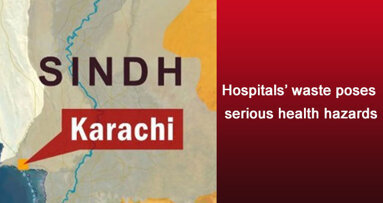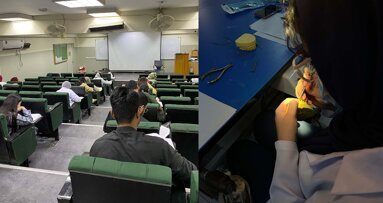While experts term many factors as the reason behind such mayhem of monsoon, one most poignant factor is solid waste that eventually leads to the clogging of pipes and drainage systems. Solid waste, of any sort, can be unsafe for people but it’s the hospital waste that is termed as the riskiest for humans. According to WHO, out of total medical waste, 15% is considered hazardous material that may be infectious, chemical, or radioactive.
COVID-19: Alleviating the risk of biomedical waste hazard
The pandemic of COVID-19 made medical waste and its disposal one of the top priorities around the world. Likewise in Pakistan, the Environmental Protection Agency (EPA) has strictly instructed all the hospitals of Pakistan dealing with coronavirus patients to ensure proper disposal of COVID-19 waste. In Karachi, hospitals were directed according to the guidelines issued under Section 6(1) of the Sindh Environmental Protection Act 2014 (SEPA Act 14), that every hospital owner, occupier, the operator shall be responsible for the management of hospital waste/handling of waste from COVID-19 patients generated by it till its final disposal following the provision of the Sindh Environmental Protection Act 2014 and its subsequent Hospital Waste Management Rules 2014.
The debate of hospital waste management: A never-ending controversy
But the question arises, are these guidelines for hospital waste management followed thoroughly? The answer to this is an ongoing and never-ending debate. When last year, Shaniera Akram’s video showing the hospital waste dumped wash ashore in Karachi went viral on social media, a new controversy began. Hospital authorities went head over heels to clarify how it was not their ‘hospitals’ dump.’ Close sources, however, revealed that many hospitals have no standard procedures to treat the waste. No one knows what happened to the waste and even the pandemic couldn’t change old habits. The careless attitude of hospital authorities has created the same fiasco, this time around, when many people complain of syringes, needles, and other medical waste ending up in their homes with the floodwater.
The ultimate cure
Pakistan’s many private and big government hospitals have their own incinerators. But, those hospitals or labs who don’t own one, should be in contact with the outside companies to ensure the proper disposal of waste. The Municipal Authorities should ensure that at the time of collection from the hospital wards, all medical waste should be completely sealed in bags and disposed of in an incinerator and the process is monitored by the hospital’s infection control committee.
It is only through an intelligent approach by the Solid Waste Management Board and municipalities that can ensure proper water flows into drainage pipes and prevent medical waste from becoming a total liability for the citizens. The proper disposal of hospital waste cannot completely eradicate the issue of urban flooding, but it surely can lessen the burden of misery on people to some extent.



 International / International
International / International
 Brazil / Brasil
Brazil / Brasil
 Canada / Canada
Canada / Canada
 Latin America / Latinoamérica
Latin America / Latinoamérica
 USA / USA
USA / USA
 Austria / Österreich
Austria / Österreich
 Bosnia and Herzegovina / Босна и Херцеговина
Bosnia and Herzegovina / Босна и Херцеговина
 Bulgaria / България
Bulgaria / България
 Croatia / Hrvatska
Croatia / Hrvatska
 Czech Republic & Slovakia / Česká republika & Slovensko
Czech Republic & Slovakia / Česká republika & Slovensko
 France / France
France / France
 Germany / Deutschland
Germany / Deutschland
 Greece / ΕΛΛΑΔΑ
Greece / ΕΛΛΑΔΑ
 Hungary / Hungary
Hungary / Hungary
 Italy / Italia
Italy / Italia
 Netherlands / Nederland
Netherlands / Nederland
 Nordic / Nordic
Nordic / Nordic
 Poland / Polska
Poland / Polska
 Portugal / Portugal
Portugal / Portugal
 Romania & Moldova / România & Moldova
Romania & Moldova / România & Moldova
 Slovenia / Slovenija
Slovenia / Slovenija
 Serbia & Montenegro / Србија и Црна Гора
Serbia & Montenegro / Србија и Црна Гора
 Spain / España
Spain / España
 Switzerland / Schweiz
Switzerland / Schweiz
 Turkey / Türkiye
Turkey / Türkiye
 UK & Ireland / UK & Ireland
UK & Ireland / UK & Ireland
 China / 中国
China / 中国
 India / भारत गणराज्य
India / भारत गणराज्य
 Vietnam / Việt Nam
Vietnam / Việt Nam
 ASEAN / ASEAN
ASEAN / ASEAN
 Israel / מְדִינַת יִשְׂרָאֵל
Israel / מְדִינַת יִשְׂרָאֵל
 Algeria, Morocco & Tunisia / الجزائر والمغرب وتونس
Algeria, Morocco & Tunisia / الجزائر والمغرب وتونس
 Middle East / Middle East
Middle East / Middle East
























































To post a reply please login or register